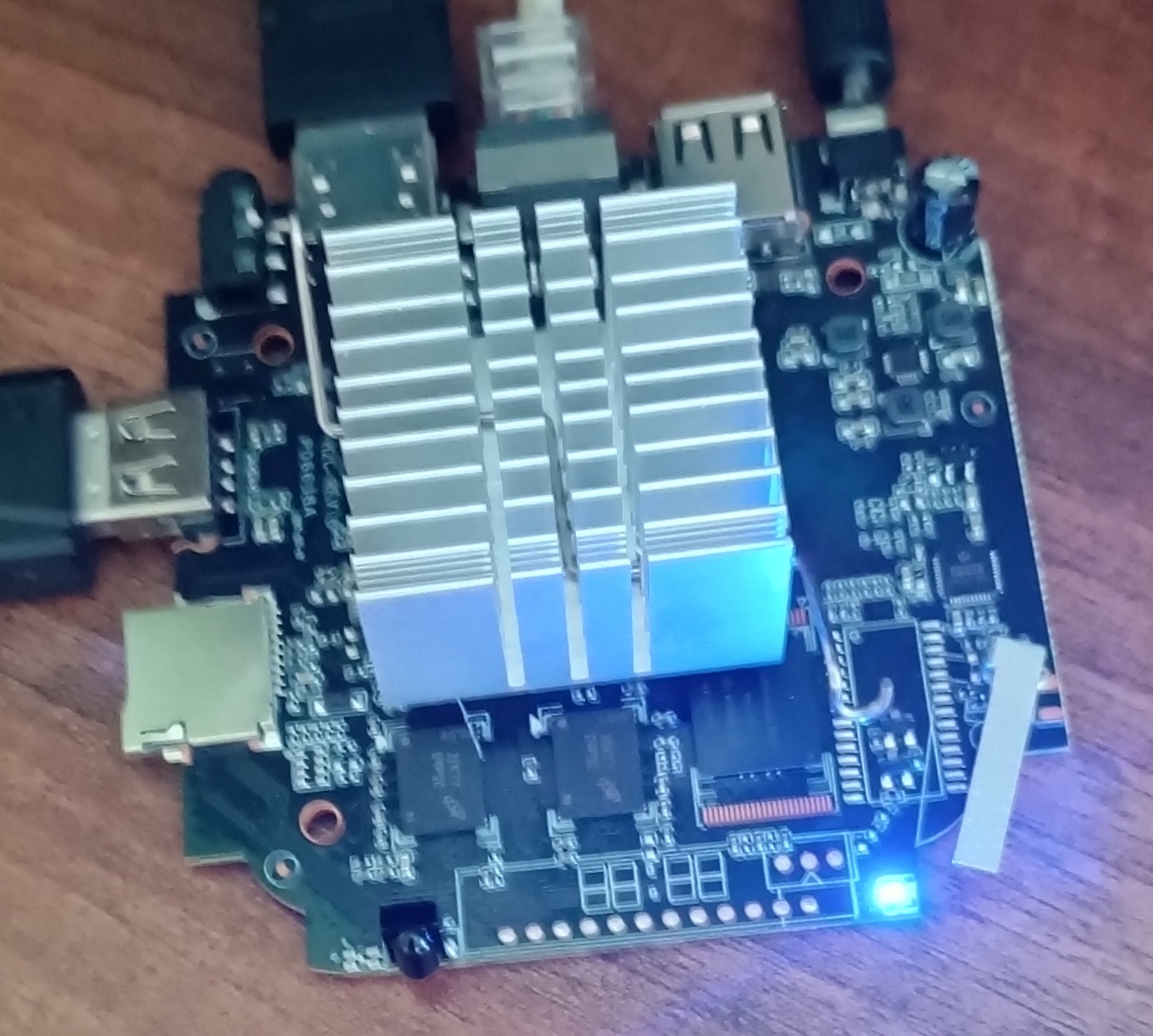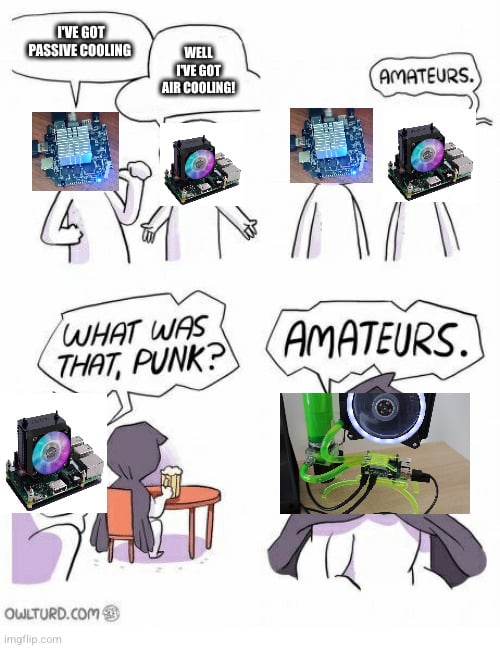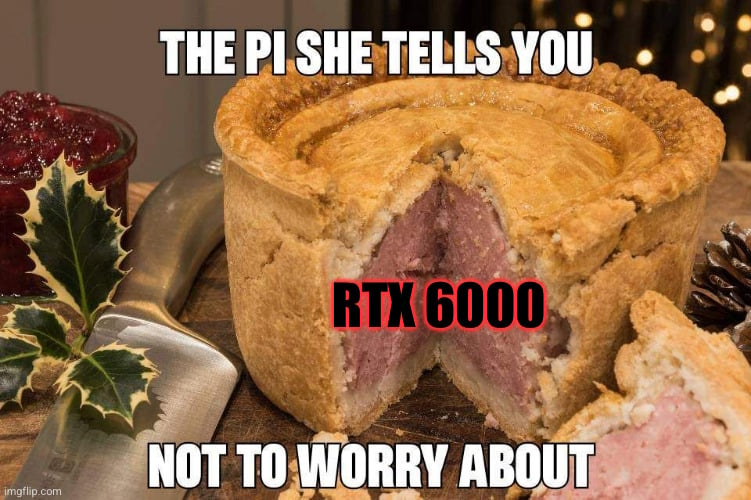I just want the Manjaro Arm to not fizzle the gui’s and run Firefox at speeds faster than 1980s era internet…
Or any desktop distro, even gnome or ubuntu
I blame the modern web for this
Remember when if your aunt wanted you to build her a computer that she’d only use for “web browsing”, that meant you could opt for the cheap components?
I fully agree with the author but I was shocked when I saw iPhone 6S. Things were bad even back then?
back then
Fuck am I old??
where does it mention iphones on that page? am I just blind?
at the end of the “fat assets” section
Things haven’t been the same since web 1.0 came out
Last year, I got myself a new Camera, a Lumix S5, and after uploading some photos to DeviantArt (I have had the same account for almost 20 years) and browsing my gallery I realized that I had had enough.
It was so slow and annoying to work with.
So I sat down and started work on a simple webpage that I could host on a normal webhost.
And I built a nice index page in HTML/CSS, and then used photo albums generated by digiKam for the photo albums.
It loads fast, it is easy to navigate, fairly easy to update, and the photo albums can be navigated with arrow keys or swipe gestures.
I am considering writing a blog UI for me to be able to make a simple blogging page, I’ll still write it in static HTML/CSS, so I’ll have to write every blog entry in HTML as it stands now, but I’ll keep looking for easier alternatives
Word. I often complain at work how programming and programmers seem to take “computing resources are cheap” as “USE FUCKING EVERYTHING”. There is fuckloads of bloat and web frameworks that are somehow marketed as “lightweight” despite making everything, even the development speed, worse in nearly every aspect.
Video playback is a wholly different thing, tho, because of all the encoding/decoding that keeps file size down.
Ah yes, the programmer curve.

If you like doing the web dev work, it’s not hard to implement a simple bbcode using regex matching and replacement. At least, it was pretty easy using php and sql.
Grav is pretty cool if you like mark down. I haven’t used it for a gallery but inserting photos is easy enough
But they should. Or at least comparable.
Think about the difference between Reddit and Lemmy. They both offer similar functionality, but Reddit will set your phone on fire if it gets the chance.
The same is true for YouTube. Browsing YouTube is scrolling through an image gallery, only video playback should be a problem. Yet, it will consume more resources than a well equipped laptop had when YouTube was launched. That’s insane.
We’re moving in a direction where computers get faster and faster, but for the last 10 years or so, the actual utility of the system as a whole stagnated. Besides games, what can a modern computer do, that a 2014 model couldn’t?
You think it’s bad now? Wait until ChatGPT is the one coding things.
Modern hardware allows for bloat, and so bloat is made. Add in a huge helping of tracking everything you do, and you get a shit pi.
Now repeat but also mess up the code some more.
Behold: the true Web 3.0
deleted by creator
You think it’s bad now? Wait until ChatGPT is the one coding things.
I mean AI code is getting banned from tons of open source projects. I don’t expect a huge AI programming boom, except for proprietary software that I won’t use on my personal systems anyways
It isn’t a a web problem. The experience is the same for any video playback on a RPI
Yeah, it’s amazing how upvoted the previous comment is. Just a bunch of idiots jumping on the web-hate bandwagon when even basic media players like Kodi have a tough time playing back video on the Pi.
It just isn’t a very optimized device for video playback. The Pi 5 is actually a step backwards as well, providing only H265 hardware video decode which the web doesn’t even use.
It’s weird to me hearing people say the Pi isn’t great for video playback when the SoC isn’t that dissimilar from what’s in a Roku box.
all Linux distros
This is not a Linux problem; Windows 10 would fare way worse. Maybe similar on a Pi 5, I’ve seen a review and it handles Full HD on either OS (only Linux can get consistent 1080p60 though).
Pi 5 can run windows?
Yes but why would you? You’ll need active cooling just doing basic things on the desktop.
Anything can at least once
Somewhat, Windows does have an ARM build afterall
I have a Pi5 hooked up to my living room TV and it does indeed play 1440p60 with zero issue. The OS is a bit laggy getting into the video, though. I want a case like I have for my Pi4, a case that allows for a built-in SSD.
There’s hardware video encoding/decoding support. I used a Pi3b+ to transcode video for a while and would easily get 2x or better on full 1080p video. The 4 is better and I’ve heard even better on the 5, but I’ve not had a compelling reason to spend that much to find out.
Yes.
Everything you say is correct.
I have a 4B, with 4 gigs.
Everything is logical.
Yet I’ve still been unable to achieve that despite trying multiple distros. Only Android of all things has successfully played YouTube (via smart tube) and video without any issues. I’ve also yet to see video evidence of smooth playback aside from one person on YouTube (Computers Explained I think), and it was only on Raspberry Pi OS. Which in fairness I kinda do too, but it takes like 12 seconds average to load a webpage on their version of Firefox (no added extensions) and either 5 or 30 on Chromium for some reason.
I’ve been trying to set the Pi as a htpc (that’s not a lobotomized Kodi box) that can also do minor streaming and a few other things, for 5 days and counting. I made a nice click friendly desktop with Manjaro KDE for Pi, and the OS itself is snappy and fast. But any major video graphical elements and it becomes a geriatric Commodore 64.
I know (read:guess) it must be that something going wrong with hardware acceleration, but just can’t figure it out. Maybe my Pi is cursed.
Even on the Pi 5 the basic desktop environment in RPI OS with hardware acceleration working feels sluggish. I’m not sure if it’s some weird power savings thing, but the pi just drops frames whenever it feels like it.
The RPi 5 SoC does not have VP9 hardware decoding which is necessary for YouTube videos. Anything above 1080p30 inside a window will suck.
Weird part is that RPi4 SoC has it.
Edit: confirmed by Raspberry Pi Foundation themselves, only hardware video decoder is HEVC.
Wait wtf really? That’s dumb.
But I’m just talking about puttering around in the basic desktop environment, not even with a web browse. Just dragging around the file browser it will randomly lag for absolutely no reason.
Yeah, I noticed that too - another reason I worked so hard trying to get that KDE Manjaro going - it was the only one which wasn’t sluggish.
using a Pi 4 4GB model as a desktop, I had the best luck with Ubuntu MATE.
Will try too
My Pi5 plays 1440p60 YT in Firefox with zero issue, from a high-performance SD card. The OS is sluggish, as another poster had mentioned. It could use an SSD.
Some tips:
- Rasberry pi OS is the lightest OS on pi
- Use Falkon as a browser, it’s much lighter
- Use mpv (or celluloid for simplicity) to watch YouTube videos and something like ytfzf (tui) or plasmatube (gui) for browsing YouTube
Also gnome is a desktop environment not a distro
My bad. Only slept 3 hours trying to get things to work last night. And 6 before that.
I had already resigned to just getting an Intel n100 mini PC for my purposes, but I might take another crack at it with your recommendations in the future, after I get some rest and stop dreaming of pies in the sky.
Except Raspberry OS. It’s still a bit sluggish for me. Manjaro KDE has been the fastest so far.
Also if you use Firefox make sure to use h264ify for hardware acceleration on YouTube
That I noticed that Raspberry Pi OS had as well built in.
Does Falkon need it since it’s Chromium based? How well will Falkon fare against ads with Manifest V3?
Falkon just uses Chromiums web engine and strips everything else, they don’t use Manifest V3 as they have their own extension system (although that isn’t really mature). It comes with a built in adblocker that works fine for browsing, but youtube ads can’t be blocked. I recommend Falkon for web browsing, but I wouldn’t use it if all you want to do is watch youtube I would use a browser that supports h264ify. For browsers that do use chromiums web extension api there is a version of h264ify, which you will need for hardware acceleration.
My experience is similar. I don’t play YouTube videos on my 4B with 8GB of RAM very often. When I do, I make sure it’s well less than a quarter of my 1920x1080 screen. (I use a tiling window manager, so I usually just make my browser window the top-left quadrant of my screen and don’t theater-mode or anything.) And I often reduce the quality to 480p or whatever.
If I’m going to watch something longer than a few minutes and want to be doing other things on my Raspberry Pi while the video is running, I’ll just pull it up on my phone propped next to my monitor.
Damn! My 3 and 4b are running headless, but my 5 has the GUI and runs high rez full screen videos perfectly on YouTube or streaming from my server. I would love to see how my 4b would play videos, but it’s headless and I don’t wanna mess with it. My 4b is running on an SSD as well (I think that’s unnecessary but I found a cool case)
You have black magic
That is why I do shit like this.


Good one, love it! 😂
Still, it keeps the temp down to about 60C, that’s good enough compared to 85C before that.
Theres better ways to play YouTube on SBC
The issue is trying to run a video in Firefox. Modern web browsers consume a lot of resources. Also they don’t use your hardware efficiently for video playing. You need to take some time to set up a native video player application to play YouTube videos. This better uses the SBC hardware acceleration without wasting precious resources.
How to play YouTube through SMPlayer
Use your operating systems software installer to Install the latest versions of smplayer, smtube, and mpv. Use smtube to select a YouTube video. This sends the network stream URL to smplayer which detects its a YouTube video and downloads the latest yt-dlp to help stream it. If everything is up to date, it plays great.
Not all OS keep their software up to date. Some prefer older stable packages. So its important to use a OS that keeps this software updated. I know for sure MX Linux works with its default software repos out of the box. Its available for Pis, though I have not personally installed on a PI.
Configure SMTube To Use Invidious
Once you get YouTube videos playing, go into settings of smtube to change the web page from tonvid to a custom invidious instance. Pick one thats ideally from your country and that lets you register an account. That way you can import subscriptions and personalize stuff.
Hiccups when using smtube to load an invidious site: the default language will be some foreign language. Make sure you know how to go to settings in invidious and change to english. To load the video click on small youtube icon bottom right of video.
Old Hardware Given New Life
I have revived lots of old PCs over the years. Giving them a new lease on life with up to date linux operating systems for friends and family. I have a 15 year old laptop that was finally having a hard time running latest linux mint xfce. This week I got to work reviving it.
I gave mx linux a shot as I liked ExplainingComputers review of the OS and thought it good fit for my use case. Installing these programs right from MX’s software repositiories was a breeze. Youtube played effortlessly! MX is pretty minimal and im sure most pis can run it okay, so give it a shot if you want a OS with up to date repos for these packages if youtube is one of your main concerns.
Very useful, I’ll try this too.
Question though - I thought yt-dlp downloaded videos?
And can sponsor block be integrated into this in any way?
When you ‘stream a video’ from firefox it just downloads the video in small chunks at a time instead of the whole thing at once. These chunks of downloaded video are saved to temporary memory called a ‘cache’ and deleted after you are done the video.
Yes yt-dlp is most often used to download the entire video as a digital file onto permanent memory; however it doesn’t have to be used that way. Other applications like smplayer and mpv can work with yt-dlp. Using it as a component to do the heavy lifting of talking to youtubes servers and streaming video in the same exact way firefox does.
Doing a quick search, there are some projects to implement mpv with sponsorblock. Im not the most technical person and prefer not to get my hands dirty with complex hacked together scripts that require compilation or whatever. Thats not to discourage you if you want to follow up on those things know people are working on it but if you aren’t a power user it may be a hard time to get that kind of thing working.
That’s extremely useful to know about yt-dlp.
I’ve only ever used it to download videos permanently fire offline viewing when traveling. I never knew it could work as a temp cache as well.
I’ll probably make a comment linking comments here with good solutions soon.
Ask that’s left is to figure out a decent IPTV program. Really liked Hypnotix but it seems it’s just too much for the Pi
have you tried VLC? It works with IPTV if I am remembering right.
I didn’t know VLC worked with IPTV. I’m guessing through plug in?
VLC was giving me issues too when playing video as well though, but only on some distros
How to play IPTV using iptv-org playlist and VLC
More directions at iptv-orgs github
- open up VLC (and most other media players)
- select the media tab in top left, navigate to ‘open network stream’
- paste this URL: https://iptv-org.github.io/iptv/index.m3u to import the global playlist of all iptv-org streams
- Open vlc’s playlist viewer with ctrl+L or right click > view > playlist
You should see a bunch of IPTV streams to choose from. Go to search bar located top right to search playlist for the stream you want. You can look for a more specific iptv-org playlist for your language and stuff. when commercial breaks happen it just shows a still frame. If nothing is playing right away try waiting a few minutes.
I hope all this has helped you out, Lumisal. I updated the formatting on my comments to closer resemble a guide in case you decide to link them in the future. Enjoy your open and energy efficient computing!
I use ash btw
I recently dipped my toe into Linux with a raspberry pi and couldn’t figure out why Firefox was so laggy. I thought maybe I did something wrong.
Well it’s refreshing to see I’m not the only one
You need a machine with a functional GPU
Try it in a vm if you don’t want to install it on bare metal (that isn’t a raspberry pi)
You can also find cheap ass second hand laptops on ebay for similar prices to pis but should have much better performance, especially if you’re willing to do some upgrades like installing a cheap ssd instead of the hdd.
I connected my raspberry pi to an rtx 6000

At that point it’s a raspberry beefcake, yeah?
My vote is raspbeefy wellington
My Pi5 won’t even support my backlit mechanical keyboard lawl
Raspberry PIs don’t have a proper GPU with decoding. That’s part of why they stink. The other issue is that they are locked to the Raspberry Pi kernel. They are absolutely proprietary!
So something like a Banana Pi wouldn’t have this issue?
To be honest with you I don’t know what chip the Banana pi has so I don’t know. It just annoys me that RPi is a Broadcom device
Tried to get tons of distros working on my pi5 last week. It sucked. Then I found out that I need some special kernel.
But I thought it’s just about things that aren’t merged into the mainline kernel yet?
It can’t ever be merged (Broadcom)
YouTube serves VP9 video (and more recently a lot of AV1) and I think the Pis only have hardware accelerated decoding of H.264/5 as it stands today
this is why h264ify is a pre-installed extension in RPiOS’ builds of browsers.
made sense, until the Pi 5 dropped h264 hw decode. still waiting for a good explanation of that.
It’s a good thing projects like Armbian are steadily improving support for Rockchip-based SBCs, to open up the market beyond Raspberry.
You just need a program that actually supports the hardware video decoder. I’ve played 30-40mbps bluray rips on a Raspberry Pi 1B without any issues in kodi. The video played smoothly with no frame drops. The user interface was very sluggish though.
The GPU and video acceleration on the Pi is weird, so software has to be built specifically for it.
Actually, Kodi did work well, yes.
It’s just that I really dislike Kodi for the purposes I wanted to use the Pi for 😅
Even the YouTube made for it worked (although the interface is… Well, it’s an interface).
It’s still a plan D, in case can’t get anything else to work
If only it were open
I guess we can’t have a non proprietary open Linux computer
Is this a 4K HDR+ DV meme?
I’ve got low standards. At this point I’d be happy with 720p
Yeah, gimmie some nice bitrate and Im happy. I would vastly prefer more fps over more pixels.
I’m running an all the mods 6 Minecraft server on my pi 5 with zero lag
No idea how video performance is but it’s got a dedicated GPU so supposedly better.
Booting from an NVME, official heat sink/fan and proper power supply
How many players do you have on it at once and do you leave it on 24/7? Might use mine for that
2 or 3 at a time normally but I’m fairly sure it could handle more depending on modpack
If you’re doing it you need to get absolutely all the optimisation mods you can for the version and most importantly pregenerate the world. Once you do those things with two or 3 on it’ll hover around 80% CPU usage
I will say with 4 players on Infernal Origins it struggles, I suspect because it turns up the mob spawn rate, adds custom mob AI and generates massive unlit caves everywhere for them to spawn in
On the ATM server we have 5 max upgraded apotheosis mob spawner grinders running 24/7 chunk loaded and the server’s still pretty snappy still
Cool that would work perfect for my group then, thanks
Just make sure you optimise and pregenerate the world
Same setup as you, fan and NVMe and I can play 720-1080p video without any issues from all of the streaming platforms I’ve tried so far as well as local files. Also streaming 1080p 60Hz gameplay from my gaming setup over LAN with no problems.
External video card would probably work well now that you mention it. But at that point, for what I want to use it for, I might as well do an Intel Mini PC since it would use less power.
But good project idea if I ever want to set up a Minecraft server.
I would still eat that
I’m considering it too, unfortunately
I’m going to the store to buy a pie now
I run OSMC on a Pi 4 and it plays h.265 & h.264 videos at 1080p and h.262 at 576p just fine.
Yes, but OSMC can’t run moonlight or edit certain typed documents as far as I know
I don’t know moonlight and don’t know what you mean by “certain typed documents”, but AFAIK, OSMC is just Raspbian with some additional stuff. What I am saying is that media playback works just fine performance-wise for some media formats.
Moonlight is for game streaming. Basically if you want to run anything newer than an N64 on a Pi, you can stream it with moonlight from a more powerful computer. It’s easy on local network, but can take a little bit more know how to set up for remote play (looked like if you want to play something on your phone away from home for example).
Thanks for the explanation













